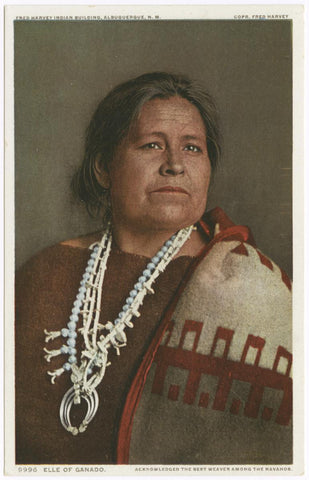President Roosevelt and Elle of Ganado

What do President's day and Navajo weavings have in common? A wonderful 2001 article published in "Frontiers: A Journal of Women Studies" brings both together in a way which helped shape the nation. Please grab a cup of tea, sit back and let your heart be filled.
Elle Meets the President: Weaving Navajo Culture and Commerce in the Southwestern Tourist Industry(1)
During the spring of 1903, President Theodore Roosevelt included a two-hour stop in Albuquerque while on a speaking tour through the western territories. the Commercial Club of Albuquerque chose a Navajo woman, called Elle of Ganado, to weave a gift for the president - a textile rendition of his honorary Commercial Club membership card. Club members provided the design, which Elle wove quickly in hand-spun red, white, and blue yarn.

During his tour of Albuquerque, Roosevelt visited the Commercial club, where he received Elle's blanket, and he stopped by the Alvarado Hotel's Indiana Building, where he met the weaver herself. An Albuquerque newspaper reported that upon meeting the weaver, the "president gave her a hearty shake and told her how much he appreciated her work. The little speech was interpreted and pleased the Indian woman beyond expression."
Although her own thoughts were apparently "beyond expression," Elle's image spoke volumes to turn-of-the-century Americans, showing New Mexico as not only conquered, but commercialized, safe for investment and safe for statehood.
Indeed, Commercial Club members orchestrated this performance as part of a statehood campaign, a drive for integration into the social, economic, and political life of the United States, an effort that would not pay off for nearly ten more years.
Elle and the president's meeting suggests ways in which race and gender, regional and national politics, culture and commerce interacted and were inextricably linked as the twentieth century began.
 The pivotal role that Elle played in Roosevelt's visit reveals that while we tend to think of women like Elle as marginalized historical figures, they were far from peripheral to the unfolding of the twentieth-century American history. Not only can we better understand such women by placing them within the larger economic, cultural, and political context of their times, but we can better understand that context by putting a woman like Elle at its center. Elle of Ganado, also called Asdzaa Lichii' (Red Woman) in Navajo, was born to the Black Sheep Clan and lived in the southern part of the Navajo Reservation near the Hubbell Trading Post in Ganado, Arizona. She might have been about 50 years old at the time she met Roosevelt, and she lived until 1924. She was acknowledged as the best weaver among the Navajo.
The pivotal role that Elle played in Roosevelt's visit reveals that while we tend to think of women like Elle as marginalized historical figures, they were far from peripheral to the unfolding of the twentieth-century American history. Not only can we better understand such women by placing them within the larger economic, cultural, and political context of their times, but we can better understand that context by putting a woman like Elle at its center. Elle of Ganado, also called Asdzaa Lichii' (Red Woman) in Navajo, was born to the Black Sheep Clan and lived in the southern part of the Navajo Reservation near the Hubbell Trading Post in Ganado, Arizona. She might have been about 50 years old at the time she met Roosevelt, and she lived until 1924. She was acknowledged as the best weaver among the Navajo.
At the suggestion of trader John Lorenzo Hubbell, she and her husband Tom began spending substantial periods of time in Albuquerque beginning in 1903 after the Fred Harvey Company opened its Indian Building as part of the Alvarado Hotel complex at the Santa Fe Railroad depot. Together with other Navajo and Pueblo families, they worked as arts and crafts demonstrators within the burgeoning southwestern tourist industry.
You may read the rest of this fascinating article online here: https://www.jstor.org/stable/3347066
Navajopeople.org has an interesting piece about Elle's husband Tom here: http://navajopeople.org/blog/elle-ganado-wife-of-tom-ganado/
1Moore, Laura Jane. “Elle Meets the President: Weaving Navajo Culture and Commerce in the Southwestern Tourist Industry.” Frontiers: A Journal of Women Studies, vol. 22, no. 1, 2001, pp. 21–44., www.jstor.org/stable/3347066.
- Beth Barth






